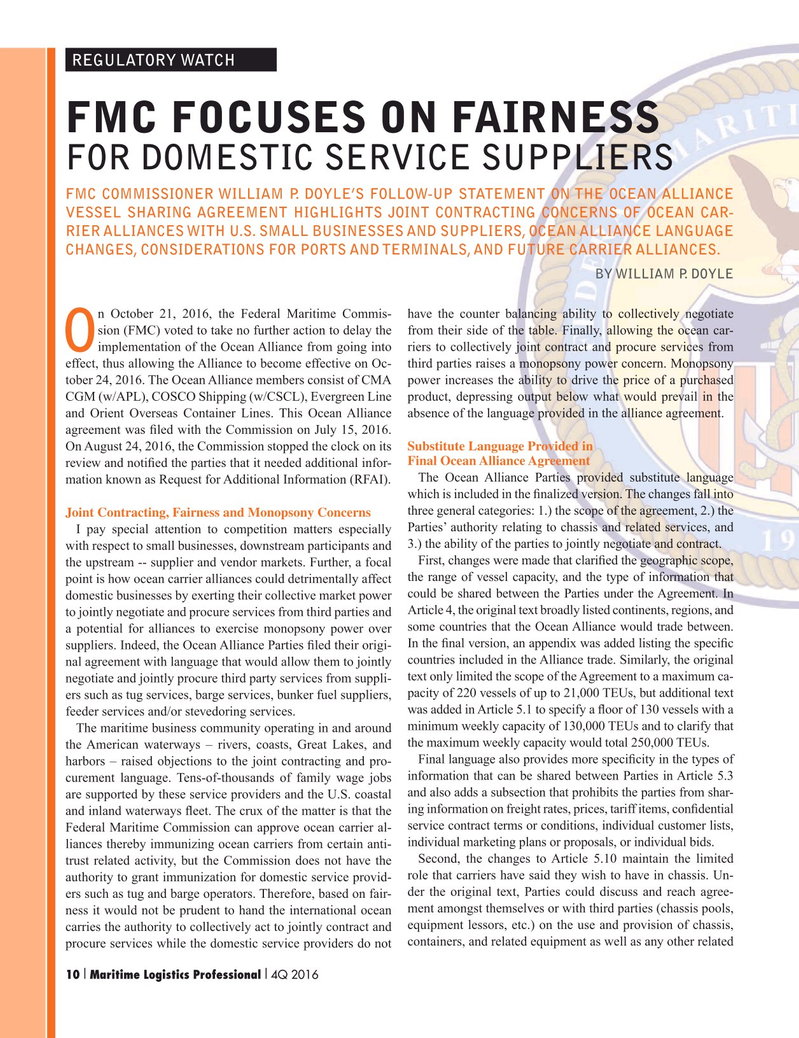
Page 10: of Maritime Logistics Professional Magazine (Q4 2016)
Workboats
Read this page in Pdf, Flash or Html5 edition of Q4 2016 Maritime Logistics Professional Magazine
REGULATORY WATCH
FMC FOCUSES ON FAIRNESS
FOR DOMESTIC SERVICE SUPPLIERS
FMC COMMISSIONER WILLIAM P. DOYLE’S FOLLOW-UP STATEMENT ON THE OCEAN ALLIANCE
VESSEL SHARING AGREEMENT HIGHLIGHTS JOINT CONTRACTING CONCERNS OF OCEAN CAR-
RIER ALLIANCES WITH U.S. SMALL BUSINESSES AND SUPPLIERS, OCEAN ALLIANCE LANGUAGE
CHANGES, CONSIDERATIONS FOR PORTS AND TERMINALS, AND FUTURE CARRIER ALLIANCES.
BY WILLIAM P. DOYLE n October 21, 2016, the Federal Maritime Commis- have the counter balancing ability to collectively negotiate sion (FMC) voted to take no further action to delay the from their side of the table. Finally, allowing the ocean car-
Oimplementation of the Ocean Alliance from going into riers to collectively joint contract and procure services from effect, thus allowing the Alliance to become effective on Oc- third parties raises a monopsony power concern. Monopsony tober 24, 2016. The Ocean Alliance members consist of CMA power increases the ability to drive the price of a purchased
CGM (w/APL), COSCO Shipping (w/CSCL), Evergreen Line product, depressing output below what would prevail in the and Orient Overseas Container Lines. This Ocean Alliance absence of the language provided in the alliance agreement. agreement was ? led with the Commission on July 15, 2016.
On August 24, 2016, the Commission stopped the clock on its Substitute Language Provided in
Final Ocean Alliance Agreement review and noti? ed the parties that it needed additional infor-
The Ocean Alliance Parties provided substitute language mation known as Request for Additional Information (RFAI). which is included in the ? nalized version. The changes fall into three general categories: 1.) the scope of the agreement, 2.) the
Joint Contracting, Fairness and Monopsony Concerns
I pay special attention to competition matters especially Parties’ authority relating to chassis and related services, and with respect to small businesses, downstream participants and 3.) the ability of the parties to jointly negotiate and contract.
First, changes were made that clari? ed the geographic scope, the upstream -- supplier and vendor markets. Further, a focal point is how ocean carrier alliances could detrimentally affect the range of vessel capacity, and the type of information that domestic businesses by exerting their collective market power could be shared between the Parties under the Agreement. In
Article 4, the original text broadly listed continents, regions, and to jointly negotiate and procure services from third parties and a potential for alliances to exercise monopsony power over some countries that the Ocean Alliance would trade between.
In the ? nal version, an appendix was added listing the speci? c suppliers. Indeed, the Ocean Alliance Parties ? led their origi- nal agreement with language that would allow them to jointly countries included in the Alliance trade. Similarly, the original text only limited the scope of the Agreement to a maximum ca- negotiate and jointly procure third party services from suppli- ers such as tug services, barge services, bunker fuel suppliers, pacity of 220 vessels of up to 21,000 TEUs, but additional text was added in Article 5.1 to specify a ? oor of 130 vessels with a feeder services and/or stevedoring services.
The maritime business community operating in and around minimum weekly capacity of 130,000 TEUs and to clarify that the American waterways – rivers, coasts, Great Lakes, and the maximum weekly capacity would total 250,000 TEUs.
Final language also provides more speci? city in the types of harbors – raised objections to the joint contracting and pro- curement language. Tens-of-thousands of family wage jobs information that can be shared between Parties in Article 5.3 are supported by these service providers and the U.S. coastal and also adds a subsection that prohibits the parties from shar- and inland waterways ? eet. The crux of the matter is that the ing information on freight rates, prices, tariff items, con? dential service contract terms or conditions, individual customer lists,
Federal Maritime Commission can approve ocean carrier al- individual marketing plans or proposals, or individual bids.
liances thereby immunizing ocean carriers from certain anti-
Second, the changes to Article 5.10 maintain the limited trust related activity, but the Commission does not have the role that carriers have said they wish to have in chassis. Un- authority to grant immunization for domestic service provid- der the original text, Parties could discuss and reach agree- ers such as tug and barge operators. Therefore, based on fair- ness it would not be prudent to hand the international ocean ment amongst themselves or with third parties (chassis pools, carries the authority to collectively act to jointly contract and equipment lessors, etc.) on the use and provision of chassis, procure services while the domestic service providers do not containers, and related equipment as well as any other related 10 Maritime Logistics Professional 4Q 2016I I 1-17 Q4 MP2016.indd 10 11/10/2016 2:31:10 PM

 9
9

 11
11
